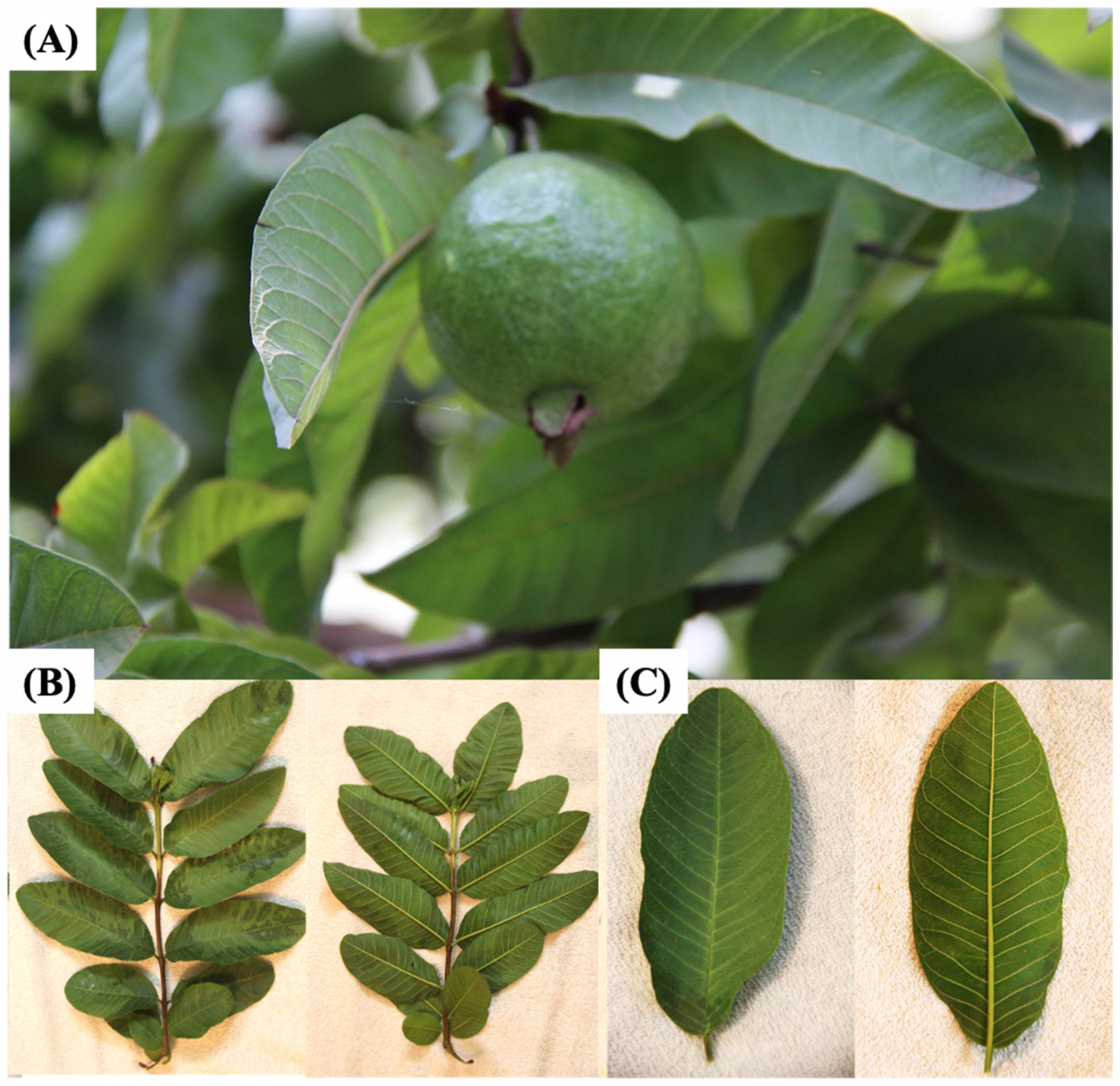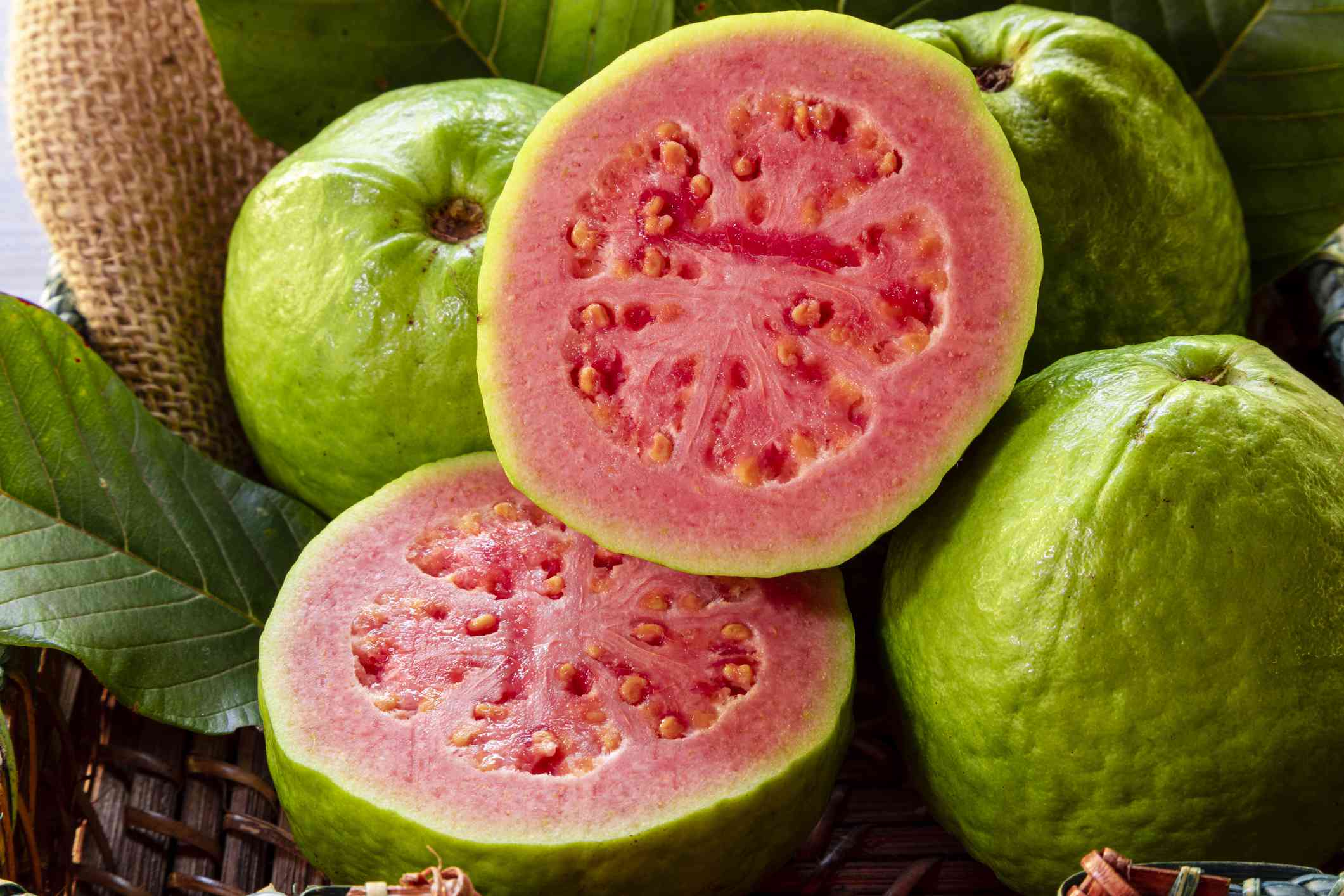Contents:
Common Names | Parts Usually Used | Plant(s) & Culture | Where Found | Medicinal Properties | Biochemical Information
Uses | Formulas or Dosages | Nutrient Content | How Sold | Warning | Resource Links
Scientific Names

- Psidium guajava L.
- Psidium guajava Linn.
Common Names
- Amrood
- Amrut Phala
- Araçá-goiaba (Brazil)
- Araçá-Guaçú
- Banjiro (Japanese)
- Brazilian Guava
- Brazilian Red Guava
- Common Guava
- Fan Shi Liu
- Feuille de Goyavier
- Goiabeiro
- Goyabe
- Goyave Jaune
- Goyave Rouge
- Goyavier
- Goyavier du Brésil
- Guaiava
- Guajava
- Guava
- Guavenbaum
- Guayabo
- Guayave
- Gwaaba
- Goyave (French)
- Guave (German)
- Goiaba (Portuguese)
- Guayaba (Spanish)
- Jambu Batu
- Koejawel
- Lemon Guava
- Mansala
- Pépin de Goyave
- Poor man’s apple of the tropics
- Psidium
- Psidium guajava
- Pulpe de Goyave
- Red Guava
- Yellow Guava
Parts Usually Used
The leaves, fruit, bark, roots, and flowers. Various parts of the plant, including the leaf and the fruit, are used as medicine, with leaves being the most commonly used for medicinal purposes.
Back to Top
Description of Plant(s) and Culture

Guava is a small tree that grows up to 10 meters high with thin, smooth, patchy, peeling bark. The leaves are opposite, short-petiolate, with oval blades featuring prominent pinnate veins, measuring 5-15 cm long. The flowers are somewhat showy with whitish petals up to 2 cm long and numerous stamens. The fruit is a fleshy yellow globose to ovoid berry about 5 cm in diameter with an edible pink mesocarp containing numerous small hard white seeds.
Back to Top
Where Found
Guava is native to tropical areas from southern Mexico to northern South America, extending throughout Central and South America. It now grows in all tropical and subtropical areas of the world, adapting to different climatic conditions but preferring dry climates. The plant is widely cultivated in India, Indonesia, Pakistan, Bangladesh, the Philippines, Africa, Asia, and many other tropical and subtropical regions worldwide. In India, although planted in almost all states, Andhra Pradesh, Assam, Bihar, Maharashtra, Uttar Pradesh, and West Bengal are important cultivators.
Back to Top
Medicinal Properties
Guava possesses numerous medicinal properties that have been extensively researched and documented. The plant exhibits antimicrobial, antioxidant, anti-inflammatory, antidiabetic, anticancer, antidiarrheal, hepatoprotective, cardioprotective, antispasmodic, analgesic, antipyretic, immunomodulatory, antihypertensive, anti-allergic, wound healing, and nephroprotective properties.
The guava fruit is a source of vitamin C, fiber, and other substances that act as antioxidants. Antioxidants slow down or stop the harmful effects of oxidation. Guava leaves also contain chemicals with antioxidant and other effects, including phenolic compounds, flavonoids, triterpenoids, sesquiterpenes, glycosides, alkaloids, and saponins.
Studies have demonstrated the plant’s effectiveness against various conditions including gastrointestinal infections, respiratory infections, oral and dental infections, skin infections, diabetes, cardiovascular diseases, cancer, malnutrition, women’s health problems, pain, fever, liver problems, and kidney problems. The antimicrobial properties are effective against 34 bacterial species, 19 fungal species, six protozoal species, and four types of viruses.
Back to Top
Biochemical Information
Guava leaves contain a rich array of bioactive compounds responsible for their medicinal properties. Key components include:
- Flavonoids: Quercetin, avicularin, apigenin, guaijaverin, kaempferol, hyperin, myricetin, catechin, epicatechin, isoquercitrin, rutin
- Phenolic acids: Gallic acid, chlorogenic acid, caffeic acid, ferulic acid, ellagic acid
- Tannins: Various condensed and hydrolyzable tannins
- Triterpenoids: Betulinic acid, lupeol, ursolic acid
- Essential oils: β-caryophyllene, α-pinene, 1,8-cineole, limonene
- Polysaccharides: Water-soluble polysaccharides with antioxidant properties
- Meroterpenes: Guajadial, psidial A, psiguadial A and B
Quercetin is identified as one of the most predominant and pharmacologically active flavonoids in guava leaves, exhibiting strong antidiarrheal, anti-inflammatory, and antioxidant activities.
Back to Top
Uses
Guava has been used in traditional medicine systems worldwide for centuries. The most common traditional use is as an anti-diarrheal remedy, with preparations of leaves used in folk medicine in several countries. Other traditional applications include:
- Gastrointestinal disorders: Diarrhea, dysentery, stomach aches, indigestion, gastroenteritis
- Respiratory conditions: Cough, sore throat, bronchitis, tuberculosis
- Women’s health: Menstrual disorders, dysmenorrhea, uterine bleeding, postpartum hemorrhage
- Oral care: Toothache, mouth ulcers, gum disease, dental infections
- Skin conditions: Wounds, ulcers, skin infections, eczema, scabies
- Metabolic disorders: Diabetes, hypertension, high cholesterol
- Pain and inflammation: Rheumatism, arthritis, general pain relief
- Fever and infections: General infections, malaria, fever reduction
Different parts of the plant are prepared as decoctions, infusions, poultices, or chewed directly depending on the condition being treated.
Modern Clinical Applications
Recent clinical trials and research have validated many traditional uses of guava:
- Diabetes management: Guava leaf tea is commercially available in Japan as a Foods for Specified Health Uses (FOSHU) product for blood sugar control
- Menstrual pain: Clinical trials show 6 mg/day of guava leaf extract significantly reduces menstrual cramps
- Cardiovascular health: Studies demonstrate reduced blood pressure, cholesterol levels, and improved heart health markers
- Diarrhea treatment: Proven effective in reducing duration and severity of acute diarrhea
- Oral health: Shown to reduce dental plaque and gingivitis when used as mouth rinse
Formulas or Dosages
Dosages vary depending on the condition and preparation method:
- For diabetes: 400g/day of guava fruit for 9 weeks, or guava leaf tea as directed
- For menstrual cramps: 6 mg flavanol/day from guava leaf extract
- For diarrhea: Decoction of guava leaves (handful of leaves boiled in water) taken throughout the day
- For oral care: Guava leaf extract mouthwash or chewing young leaves
- For general health: 50-400 mg/kg body weight of various extracts (doses from research studies)
The appropriate dose depends on several factors such as the user’s age, health, and several other conditions. Natural products are not always necessarily safe and dosages can be important. Consult healthcare professionals before using.
Back to Top
Nutrient Content
One guava fruit (approximately 55g) provides:
- 37 calories
- 0.52 g fat
- 7.86 g carbohydrates
- 2.97 g fiber
- 4.9 g total sugar
- 1.4 g protein
- 125 mg vitamin C (139% of Daily Value)
- 229 mg potassium (6.7% of Daily Value)
- 12.1 mg magnesium (2.8% of Daily Value)
- 127 mcg copper (14.1% of Daily Value)
Guava contains roughly five times the amount of vitamin C as oranges in the same serving size, making it an excellent source of this essential nutrient.
Back to Top
How Sold
Guava medicinal products are available in various forms:
- Fresh fruit and leaves
- Dried leaf powder
- Guava leaf tea bags
- Standardized leaf extracts in capsules
- Liquid extracts and tinctures
- Essential oils
- Topical creams and ointments
- Dietary supplements
Warning
General Safety: Guava fruit is generally safe when eaten as food. Guava leaf extract may be safe when used short-term as medicine, but may cause temporary nausea or stomach pain in some people.
Pregnancy and breastfeeding: Guava is likely safe when eaten as food during pregnancy and breastfeeding. However, there isn’t enough reliable information about the safety of using guava as medicine during these periods. Stay on the safe side and stick with food amounts.
Diabetes: Guava might lower blood sugar. People with diabetes should monitor blood sugar carefully when using guava medicinally, as medication doses may need adjustment.
Surgery: Guava might lower blood sugar and potentially increase bleeding risk. Stop using guava as medicine at least 2 weeks before scheduled surgery.
Eczema: Guava leaf extract might make eczema worse due to skin-irritating compounds. Use with caution if you have eczema.
Drug interactions: Guava may interact with diabetes medications, potentially causing blood sugar to drop too low. Monitor blood sugar closely and consult healthcare providers about potential dose adjustments.
Digestive effects: Due to high fiber content, consuming large amounts may cause digestive discomfort or constipation in some people.
Back to Top
Resource Links
Sacred Herbs of the Amazon: What Shamans Know That Science is Just Discovering
WebMD – Guava – Uses, Side Effects, and More
MedicalNewsToday – What are the health benefits of guava?
Health – 6 Health Benefits of Guava
WebMD – Health Benefits of Guava
ScienceDirect – Psidium guajava: A review of its traditional uses, phytochemistry and pharmacology
